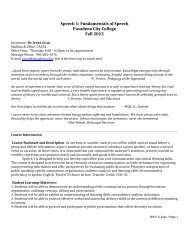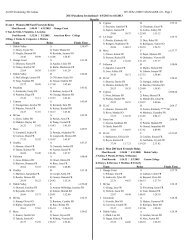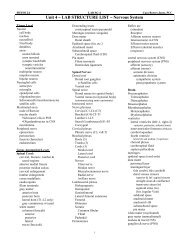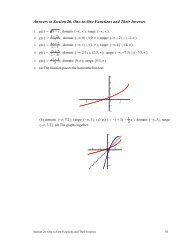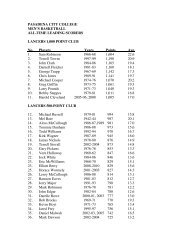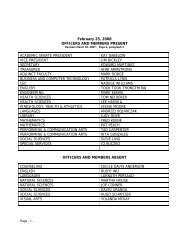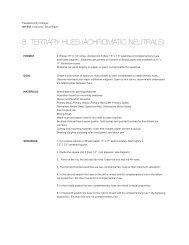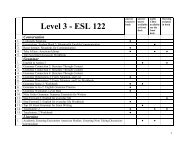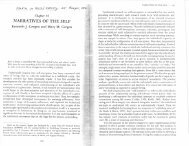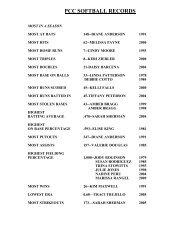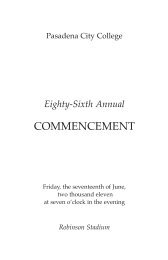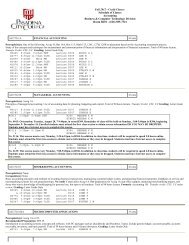36B Syllabus SP10
36B Syllabus SP10
36B Syllabus SP10
You also want an ePaper? Increase the reach of your titles
YUMPU automatically turns print PDFs into web optimized ePapers that Google loves.
ADVANCED JAZZ / COMMERCIAL THEORY<br />
MUSIC <strong>36B</strong>, SPRING 2010<br />
Tuesdays, 6:40 – 9:50 pm<br />
Instructor Information: Daniel Cole,<br />
Contact: Office V214, phone: 626-585-3171, email: dccole@pasadena.edu<br />
Office Hours: Mondays: 1:25 – 4:45, Tuesdays: 5:45 – 6:40, Wednesdays: 1:25-2:45<br />
Required texts: There is no required text for this class. Readings will be assigned<br />
throughout the semester.<br />
Required website: pcc.blackboard.com<br />
Username:<br />
FIRST INITIAL, MIDDLE INITIAL (use an X if you have no middle initial),<br />
LAST INITIAL, then the last four digits of your student ID number<br />
Password:<br />
SAME AS PASSWORD USED TO REGISTER<br />
Important Policies:<br />
1. Assignments are due at the beginning of the next class after they are<br />
assigned<br />
2. Late assignments are eligible for 90% credit if submitted the following<br />
week.<br />
3. Assignments more than a week late will not be accepted.<br />
4. The final and midterm exams will not be given early or late unless in<br />
the case of extreme circumstances. Please check the final exam<br />
schedule early and plan accordingly.<br />
Student Learning Outcomes:<br />
1. Apply various jazz scales to related chords in a composition.<br />
2. Identify and construct polychords.<br />
3. Analyze and apply reharmonization techniques to an existing composition.<br />
4. Arrange a piece of music using voicing techniques for four parts including<br />
close & open voicings.<br />
5. Rearrange a melody using techniques of melodic and rhythmic variation.<br />
Grading :<br />
1. Midterm examination. 10 %<br />
2. Projects will be assigned that require you to demonstrate<br />
command of the skills / concepts covered in class. Late<br />
assignments will lose 10 points per class meeting . 30%<br />
total<br />
3. Style Presentation 10%<br />
4. Listening Quizzes. 15%<br />
5. Final Exam. 15%<br />
6. Portfolio 10%<br />
7. Preparation / Participation. 10%
Schedule of Topics: Subject to Change<br />
1. Intro / Preamble:<br />
a. Review Jazz Standard:<br />
i. Form<br />
ii. Melody<br />
iii. Harmony<br />
iv. Voiceleading<br />
b. Schenker Revisited<br />
c. How Standard Jazz Harmony Moves<br />
d. ASSIGNMENT: Project 1: Harmony - Analysis / Composition<br />
2. Standard Jazz Melody<br />
a. DUE: Project 1: Harmony, due at the beginning of class<br />
b. Diatonic Melodies<br />
c. Motivic Development<br />
d. Melodic Permutations<br />
e. Bebop Melodies<br />
f. Bebop Form – Dizzy Gillespie<br />
g. Contrafacts<br />
h. Sketches<br />
i. ASSIGNMENT: Project 2: Melody Part 1 - Analysis / Composition<br />
/ Sketch Extraction. One Standard, One Bebop Contrafact<br />
3. Advanced Chord / Scale Relationships<br />
a. DUE: Project 2: Melody, due at the beginning of class<br />
b. Pentatonic<br />
c. Upper Structures<br />
d. Diminished<br />
e. Whole Tone<br />
f. Melodic Minor<br />
g. Triad Pairs<br />
h. ASSIGNMENT: Project 3: Melody Part 2 - Analysis / Composition.<br />
i. Ongoing Assignment: Sketches DUE EVERY WEEK<br />
HENCEFORTH<br />
4. Common Progressions / Substitutions<br />
a. DUE: Project 3: Melody Part 2, due at the beginning of class<br />
b. Blues<br />
c. Rhythm Changes<br />
d. Tritone Subs<br />
e. 2 – 5 collusion<br />
f. Backdoor Turnarounds<br />
g. Bird Blues<br />
h. Eternal Triangle<br />
i. The Cycle<br />
j. Sonny Stitt
k. ASSIGNMENT: Project 4: Blues / Rhythm Changes – Analysis /<br />
Composition<br />
5. Arranging Basics<br />
a. DUE: Project 4: Blues / Rhythm Changes, due at the beginning of<br />
class<br />
b. Arranging – Instrumental Considerations<br />
c. Resolution Tendencies<br />
d. Guide Tones<br />
e. 3 part Writing<br />
f. 4 part Writing<br />
g. Open / Closed Voicings<br />
h. Inversions<br />
i. Drop 2, Drop 2 and 4<br />
j. ASSIGNMENT: Project 5: Arrangement One<br />
6. Arranging Contd.<br />
a. DUE: Project 5: Arrangement 1, due at the beginning of class<br />
b. Play arrangements<br />
c. ASSIGNMENT: Project 6: Arrangement 2<br />
d. Ongoing Assignment: Sketches<br />
7. Review For Midterm<br />
a. DUE: Project 6: Arrangement 2, due at the beginning of class<br />
b. Review For Midterm<br />
8. MIDTERM EXAM<br />
9. Advanced Harmony<br />
a. Dominant Permutations / Triadic Relationships<br />
b. Polychords<br />
c. Bitonality<br />
d. Wayne Shorter<br />
e. Reharmonization<br />
f. ASSIGNMENT: Project 7: Reharmonization<br />
10. Advanced Harmony Contd<br />
a. DUE: Project 7: Reharmonization, due at the beginning of class<br />
b. Steely Dan<br />
c. ASSIGNMENT: Project 8: Advanced Harmony<br />
11. Groove-Based Composition<br />
a. DUE: Project 8: Advanced Harmony, due at the beginning of class<br />
b. Funky Jazz<br />
c. Bass Lines<br />
d. Rhythm<br />
e. Hemiola<br />
f. Cross Rhythms<br />
g. ASSIGNMENT: Project 9: Groove-Based Composition<br />
h. ASSIGNMENT: Project 10: Final Project<br />
12. Style<br />
a. DUE: Project 9: Groove-Based Composition, due at the beginning<br />
of class
. Discuss / Workshop Final Projects<br />
c. Discuss Style Presentations<br />
13. DUE: Style Presentations,<br />
a. Workshop Final Projects<br />
14. Final Projects / Review For Final Exam<br />
a. Workshop Final Projects<br />
b. Review for Final<br />
15. Final Projects DUE: Project 10: Final Project, due at the beginning of<br />
class<br />
“My concepts show that the art of music is much simpler than present-day teachings would have it appear. However, the<br />
fact that simplicity does not lie on the surface makes it no less simple. Every surface, seen for itself alone, is of necessity<br />
confusing and always complex.”<br />
“It is the sad lot of theory in general that so often it is occupied with itself rather than with following art in a spirit of<br />
sympathy.” -Heinrich Schenker



